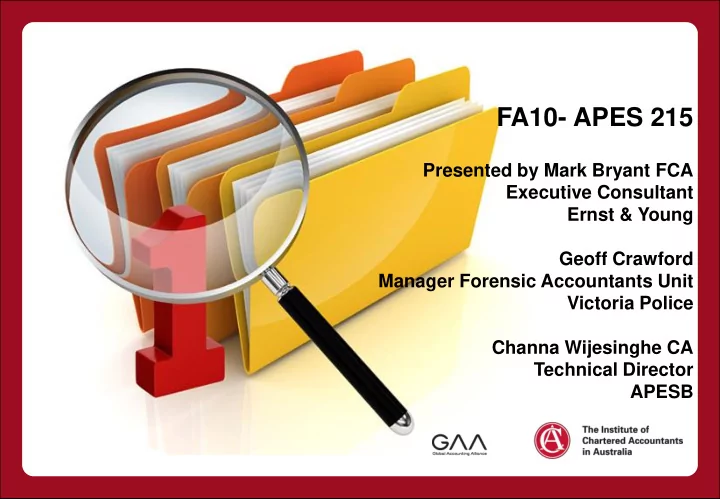

FA10- APES 215 Presented by Mark Bryant FCA Executive Consultant Ernst & Young Geoff Crawford Manager Forensic Accountants Unit Victoria Police Channa Wijesinghe CA Technical Director APESB
Background > APESB was established in February 2006 as an initiative of the ICAA and CPA Australia to develop professional and ethical standards for the accounting profession in Australia. > NIA became a Member in late 2006. > Members of the three accounting bodies are required to comply with APES Standards and subject to disciplinary procedures of the relevant body. > The former Forensic Accounting Standards were APS 11 & GN 2 > APES 215 includes mandatory requirements and guidance > Extension of scope for Members in Business APESB Taskforce – Aug 07 to Dec 08 >
Structure of APESB Pronouncements Due process and working procedures • APESB Glossary Conceptual Framework – Principles based APES 110: Code of Ethics for – Mandatory for professional accountants Professional Accountants APESB Standards • Standards Members in Members All Members Public Practice In Business – Introduces principles – Mandatory requirements in black letter APES 300 APES 400 – Series Series Guidance and/or explanation in grey letter APES 200 Series • Guidance notes Guidance notes – Members in Members Do not introduce new principles All Members Public Practice In Business – Guidance on a specific matter on which the Principles are already stated in a APES GN 30 APES GN 40 Standard Series Series – Guidance is only in grey letter APES GN 20 Series
APES 215 Forensic Accounting Services Structure > Scope and application > Key definitions > Fundamental responsibilities of Members > Professional Engagement and other matters > Expert Witness Services (EWS) > False or misleading information and changes in opinion > Quality control > Professional fees Use of the terms “facts”, “assumptions” and “opinions” >
Scope and Application > Operative on or after 1 July 2009 Engagement Members in Public Practice > Assignment Members in Business > > Where a Professional Service later becomes a FAS then APES 215 applies (Para 1.5) > Where a FAS other than EWS, later becomes a EWS then section 5 of APES 215 applies (Para 1.6)
Key Definitions > Forensic Accounting Services: – Expert Witness Services; – Lay Witness Services; – Consulting Expert Services; and – Investigation Services > Court > Expert Witness > Lay Witness > Consulting Expert > Professional Services > Proceedings > Contingent Fees > Report
Fundamental Responsibilities of Members > Public Interest – Comply with S. 100 Introduction and Fundamental Principles , S. 110 Integrity and S. 120 Objectivity of the Code – Members in Public Practice shall comply with S. 220 Conflicts of Interest and S.280 Objectivity of the Code > If it is an Assurance Engagement comply with S. 290 Independence of the Code > Disclose matters to the Court to assess the degree of independence > Comply with S.130 Professional Competence and Due Care and S. 330 Acting with Sufficient Expertise of the Code > Comply with S. 140 Confidentiality of the Code > Laws of natural justice
Professional Engagements and other matters > A Member in Public Practice shall comply with: – APES 305 - document and communicate the Terms of Engagement – S. 210 Professional Appointment of the Code
Expert Witness Services > Evaluation of prior and/or existing relationships – Member in Public Practice (para 3.8 and 5.1) – Member in Business (para 5.2) – Member in Business who is employed by a government agency (para 5.3) A Member’s obligations as an Expert Witness (para 5.4) > > The Report of an Expert Witness (para 5.6) – Relationships with any parties to the Proceedings – Reliance on work of others – Significant assumptions – Explanation why a significant assumption is likely to be misleading (if any) > A Member to consider whether APES 225 Valuation Services is applicable to the Expert Witness Service (para 5.7)
False or misleading information and changes in opinion > Shall not knowingly or recklessly make false or misleading statements > A Member subsequently becoming aware that information is false or misleading – Promptly inform the legal representative of the Client, Employer or the Court as appropriate – Consider issuing a supplementary report
Quality Control Member in Public Practice – shall comply with APES 320 Quality Control for Firms > Member in Business – utilise a system of quality control > > Proper documentation of working papers > Maintain chain of custody
Professional Fees > A Member in Public Practice – Fees will be computed in accordance with S. 240 Fees and other Types of Remuneration of the Code – Not enter into a Contingent Fee arrangement for an Expert Witness Service or Engagements that require Independence > Member in Business – Not receive contingent remuneration for an Expert Witness Service
Use of the terms “facts”, “assumptions” and “opinions” > Examples are provided to assist Members determine whether a matter is a fact, an assumption or an opinion. > Judged based on the particular facts and circumstances Fact – Expert Witness has applied specialised knowledge but has not applied any > significant degree of judgment Assumption – ordinary meaning > Opinion – Expert Witness applies a significant degree of expert judgment and > draws an inference
For information on the Code of Ethics and professional standards visit www.apesb.org.au
Recommend
More recommend